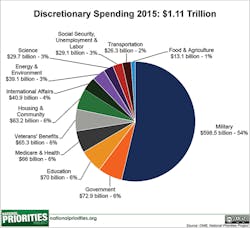"Learn from yesterday, live for today, hope for tomorrow. The important thing is not to stop questioning." — Albert Einstein
Safety professionals sometimes cannot agree on the exact sequence of circumstances which led to a particular accident, but studying why it happened inevitably helps us come to a better understanding.
It's imperative to know the root cause, if it was handled correctly and what we can do to prevent it from happening in the future. That's what makes federal agencies such as the National Highway Traffic Safety Administration (NHTSA) and Chemical Safety Board (CSB) so crucial. Yet, the FY2018 budget proposal says otherwise.
The CSB, which is independently run, has been investigating major disasters such as the Deepwater Horizon spill and West Fertilizer explosion since 1998.
The agency's budget can be compared to the revenue of a small business: $12 million. And that's pennies in the pool of federal discretionary spending.
Let's take a look at discretionary spending, or the money Congress decides to allocate to various programs and initiatives each year. Take a look at the pie chart in Figure 1.
The total Department of Defense funding is more than $200 billion more than our country's $350 billion deficit. This poses some questions such as:
- Why is spending in this area so high?
- Why do we need to spend more?
- Why the Chemical Safety Board?
When compared not only to military but to all other areas of spending, $12 million is a drop in the bucket, especially when you consider the personal net worth of many of our Congress members.
CSB's Chairperson Vanessa Allen Sutherland released the following statement after the proposed cut was announced:
The U.S. Chemical Safety Board (CSB) is disappointed to see the president's budget proposal to eliminate the agency. The CSB is an independent agency whose sole mission is to investigate accidents in the chemical industry and to make recommendations to prevent future accidents and improve safety.
For over 20 years, the CSB has conducted hundreds of investigations of high consequence chemical incidents, such as the Deepwater Horizon and West Fertilizer disasters. Our investigations and recommendations have had an enormous effect on improving public safety. Our recommendations have resulted in banned natural gas blows in Connecticut, an improved fire code in New York City and increased public safety at oil and gas sites across the state of Mississippi. The CSB has been able to accomplish all of this with a small and limited budget.
The American public is safer today as a result of work of the dedicated and professional staff of the CSB. As this process moves forward, we hope that the important mission of this agency will be preserved.
I didn't write this to argue about how we should spend federal money, but rather to make you question how we are and why.
Facts are facts. We know we've come a long way since the Industrial Revolution when it comes to workplace safety and rights, but we also know we have a way to go. Cutting independent, non-regulatory agencies only will set us back and potentially do nothing to prevent the same incidents from occurring over and over again – or history from repeating itself.
And if there's anything thing we can agree upon, it's that these agencies are critical to maintaining a safe work environment for millions of Americans.
If our nation's leaders think that $12 million is going to make or break the bank, then our mission – our duty as concerned citizens and safety leaders – is to question why they think that way.
"The tyranny of a prince in an oligarchy is not so dangerous to the public welfare as the apathy of a citizen in a democracy." — Charles de Montesquieu

